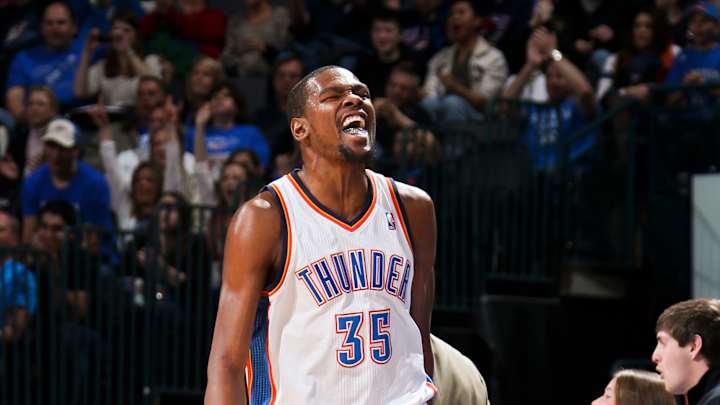Three-Pointers: Oklahoma City makes it look easy in big win over Denver

Kevin Durant and the Thunder beat the Nuggets in a laugher. (Layne Murdoch/NBAE via Getty Images)

By Rob Mahoney
In truth, the Denver Nuggets didn't survive the Oklahoma City Thunder's opening salvo on Wednesday night. They scrapped, they fast-breaked, and they did what they could, but the Nuggets were killed and buried in a lopsided first quarter, and ultimately fell, 117-97, in a game that wasn't even remotely as close as the final, 20-point margin suggests.
• One expects brilliance from a team that ranks first overall in points per possession, but occasions like this one remind us of how terrifyingly complete the Thunder's offense can be. For significant portions of this game, OKC was operating on a plane that rendered the defense irrelevant. Russell Westbrook began the evening with a 16-point first quarter (on 6-of-8 shooting) en route to 32 overall, dotting his defenders with textbook pull-up jumpers. Kevin Durant (20 points on 12 shots) is among the best in the league when it comes to converting attempts when given only the slightest bit of room to operate, and somehow seems even more brutally effective when he isn't forced to carry such a heavy scoring load. The Thunder are also a top-five team in three-point percentage, and in this game used their outstanding accuracy from beyond the arc to buoy their effective field goal percentage to a whopping 58.6 percent by the game's functional end at the third-quarter buzzer.
By that point, both coaches had already gone deep into their respective benches and agreed to play out the final 12 minutes as a formality. Westbrook, Durant, and a volley of long-range shots had done the Nuggets in early, as supplemented by the usual onslaught of free throw attempts and an unusual advantage in offensive rebounds. Top it all off with the fact that the Thunder were uncannily careful with the ball (OKC posted a turnover rate that would rank among the NBA's best on average), and this was about as entirely perfect as offensive performances come. Even if a first-quarter pummeling hadn't put the Nuggets at a huge disadvantage from the get-go, the Thunder's comprehensive offensive effort would likely still have propelled them to a decisive win.
• Once Denver took a 34-18 first-quarter clobbering, George Karl attempted a variety of different tactics as a means of jump-starting his team's offense. Among them: a small-ball look that featured Kenneth Faried as the only true big on the court for the Nuggets. At first glance, that may not seem like a bad idea; Faried is an ace rebounder, and the replacement of a court-clogging big like JaVale McGee or Kosta Koufos with a more versatile forward option gives the Nuggets the potential for better offensive flow. That alone makes Denver a far more dynamic team both in its set offense and in transition situations, but at the cost of any and all defensive hope. No lineup with Faried as the lone big has been even close to acceptable on D this season, and thus it was no surprise to see the Thunder's lead actually grow while Karl ran his gambit.
For a team with all kinds of lineup flexibility, Denver can grow oddly trapped between these extremes. Going small can work in certain contexts, but also puts Faried (whose defensive activity shouldn't be confused for defensive efficacy) in an impossible situation. Going big makes the Nuggets a bit better equipped to tackle specific opponents with interior threats or elite rebounders, but also has the potential to stymie the movement and spacing of the offense on duller shooting nights. This quandary won't come into play in most games, as the Nuggets are too talented and too lethal as an open-court team to get bogged down against just any competition. But quality opponents can put Denver in a bit of a bind, and the Thunder's vexingly prolific offense left Karl without any clear counter.
• One of the benefits of the Thunder putting a game away early: The inevitable showcase of garbage time for Perry Jones. Many considered Jones to be the steal of the 2012 Draft when the Thunder snatched him up with the 28th pick, a distinction that he richly deserves based on talent alone. In his crumbs of playing time, Jones doesn't exactly have a regular opportunity to actualize that talent in the form of impressive numbers. But each of his stints on the floor bears a tantalizing peek at his latent potential -- and this game's 14 minutes of court time were certainly no exception. We saw Jones control the ball at full speed in the open court, navigating traffic before making a clean drop pass to DeAndre Liggins. We saw his smooth form on a baseline jumper -- the kind of shot that has made Serge Ibaka so important to the Thunder offense. We saw a dead-sprint disruption of what seemed sure to be an easy score for the Nuggets, as Jones broke up a pass intended for a streaking Jordan Hamilton. We also saw Jones ignite off the floor with every intent to tear the rim down, but change direction mid-air in order to finish around a defensive challenge with a silky lay-in.
